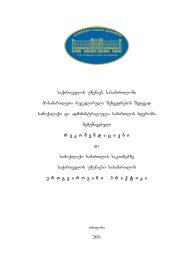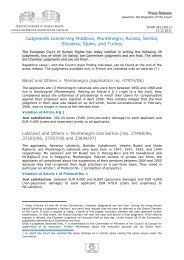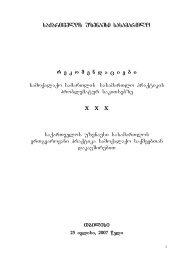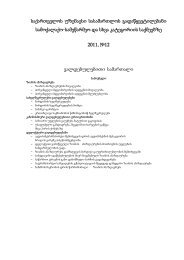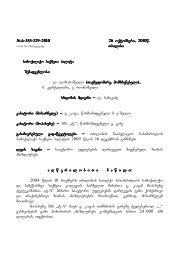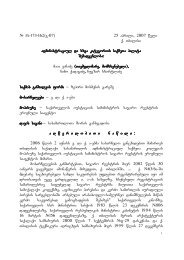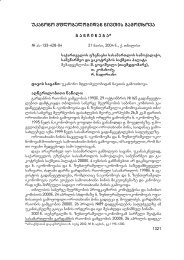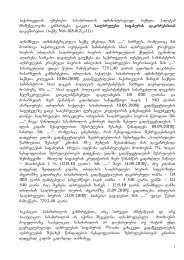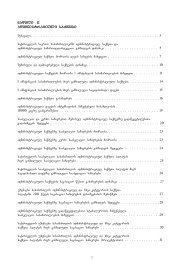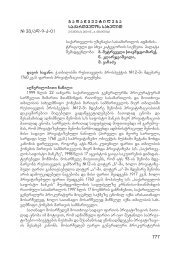67 WebMD, Webster’s New World Medical Dictionary,third edition, Wiley Publishing, 2008, 309 68 Jacobs M., Welss Conference on Adoption Law: Procreation Through Art: Why The Adoption Process should not Apply, Cap.U.L.Rev., Vol. 35, 2006, 399. 69 http://www.theafa.org/article/embryo-donationprospective-recipients. 70 saqarTvelos kanoni `Svilad ayvanisa da mindobiT aRzrdis Sesaxeb~, gamoqveynebulia ssm, 50, 31/12/2009, ZalaSia 1/01/2010. 71 igive kanonis me-5 muxli, ix.: agreTve, saqarTvelos Sromis, janmrTelobisa da socialuri dacvis ministris #50/n brZaneba `Svilad ayvanis procedurebisa da formebis damtkicebis Sesaxeb~, gamoqveynebulia ssm, 23, 26/02/2010, ZalaSia 01/03/2010. 72 igive kanonis me-15 muxlis me-6 nawili. 73 Anderson M., Are you My Mommy? A Call For Regulation Of Embryo Donation, Cap.U.L. Rev., Vol. 35, 2006, 607. 74 Kovacs G., The Subfertility Handbook: A clinician’s Guide, 2 nd ed., Cambridge University Press, 2011, 172. 75 Anderson M., Are you My Mommy? A Call For Regulation Of Embryo Donation, Cap.U.L. Rev., Vol. 35, 2006, 607. 76 Kovacs G., The Subfertility Handbook : A Clinician’s Guide, 2 nd ed., Cambridge University Press, 2011, 166. 77 Cahn N., Accidental Incest: Drawing the Line-or the Curtain? For Reproductive Technology, 32 Harvard J.L.&Gender, Vol. 58, 2009,103. 78 saqarTvelos sakonstitucio sasamarTlos 2008 wlis 30 oqtombris #2/3/406- 408 gadawyvetileba. 79 Jacobs M., Welss Conference on Adoption Law: Procreation Through Art: Why The Adoption Process should not Apply, Cap.U.L.Rev., Vol. 35, 2006, 399. 80 Cahm N., No Secrets: Openess and Donor-Concieved Half-Siblings, Cap.U.L.Rev., Vol. 39, 2011, 333. 81 Kohm L.M., Well Conference On Adoption Law: What’s My Place In This World? A response To Professor Ellen Waldman’s, What Do We Tell the Children?, Cap.U.L.Rev., Vol. 35, 2006, 568. 82 iqve. 83 kublaSvili k., ZiriTadi uflebebi, Tb., 2008, gv. 106. 84 Cahn N., Accidental Incest: Drawing the Line-or the Curtain? For Reproductive Technology, 32 Harvard J.L.&Gender, Vol. 58, 2009,102. 85 iqve. 86 http://donorsiblingregistry.com 87 http://www.hfea.gov.uk/5838.html 88 Robertson J., Reproductive Technology And Reproductive Rights: In The Beginning: The Legal Status Of Early Embryos, Va.L.Rev., Vol. 76, 1990, 512. 89 `adamianis uflebebisa da biomedicinis Sesaxeb~ konvenciis ganmartebiTi memorandumi. 90 iqve. 91 Katz K., Wells Conference On Adoptioon Law, The Legal Status Of The Ex Uteroo Embryo: Implications For Adoption Law, Cap. U.L. Rev., Vol. 35, 2006, 337. 92 Sauer M., Principles of oocute and embryo donation, Springer, 1998, 223. 93 Kindregan Ch., McBrien M., Assisted reproductive technology; a lawyer’s guide to emerging law and science, American Bar Association, 2006,122. 94 Sauer M., Principles of oocute and embryo donation, , Springer, 1998, 253 95 Sead. Robertson J., Reproductive Technology And Reproductive Rights: In The Beginning: The Legal Status Of Early Embryos, Va.L.Rev., Vol. 76, 1990, 514, romlis mixedviT, embrionis komercializacia akrZalul unda iqnes, magram donorebs SeiZleba daekisroT embrionis Seqmnis xarjebi. 96 Kindregan Ch., McBrien M., Assisted reproductive technology; a lawyer’s guide to emerging law and science, American Bar Association, 2006, 123. 97 iqve. 98 Âðèòò Ô., Ëîãèêî-ôèëîñîñîôñêèåèñëåäîâàíèÿ, Èçáðàííèå òðóäû, 1986, 300. miTiTebulia: naWyebia g., kanoniT aukrZalavis nebadarTulobis Sesaxeb, Jur. `samarTali~, #1, 1992,19. 131
marTlmsajuleba N3 da kanoni RESEARCH OF EMBRYO AND LEGAL ASPECTS OF DONATION IRMA GELASHVILI Doctor of Low, Associated Professor of the Georgian University Embryo donation is the process when the producers of the embryo in the tube deny it and give it to absolutely genetically different people. 1 The concept of “embryo donation” means transmission of the embryo aiming birth of a baby, 2 as well as with the purpose of using it as scientific object. 3 Georgian law does not envisage protection of the embryo in the tube. Georgian law on “Healthcare” does not restrain carrying out research on embryo, neither it restricts using its cells for various purposes, however, according to the Conventions on “Human Rights and Biomedicine”, Article 18.1. countries that allow in vitro research on the embryos, should also provide proper protection mechanism of embryo. Second part of the same Article prohibits production of a human embryo for the research purposes. Thus, based on the need to protect an embryo, as conditional subject, it is necessary to envisage legislative restrictions researches on developing embryos, if this research is beneficial for the embryo. The latter should be proved by special commission and bioethical committee. According to the teleological and grammatical definition of the Article 143 of the Law on “Healthcare”, we can say that embryo donation with the purpose of baby birth is allowed. At the same time, unlike the adoption institute, this issue falls under the margin of contractual freedom, and recipient of an embryo may be a person that does not fulfill adoption requirements. At the same time, it is not restricted to receive the reward, that makes the embryo subject of the trade. Since embryo is not an organ of a person and neither a person itself, this action shall not become subject of punishment according to the Criminal Code. However, embryo is much more than a human organ, thus, embryo circulation should be restricted, as universally unacceptable act. FOOTNOTES: 1 Anderson M.l., Are you My Mommy? A Call For Regulation Of Embryo Donation, Cap.U.L. Rev., Vol.35, 2006, 600. 2 Embryo donation for the receipinets, that should carry it, give a birth and raise, sometimes “adoption of an embryo” - Embryo adoption . 3 Kovacs G., The Subfertility Handbook : A Clinician’s Guide, 2 nd ed., Cambridge University Press, 2011, 166. 132



